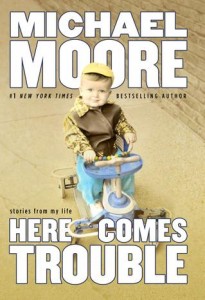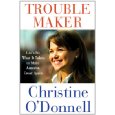 Last week, I came across Michael Moore’s new book of stories about his own life, Here Comes Trouble. Here’s how he briefly describes it on his blog (italics are mine): “It contains two dozen short stories, all based on events in my early life, before I became a filmmaker. They tell how, from a young age, the “personal” in my life slowly boiled up and exploded, quite unexpectedly, into the political.” I’m interested in reading more about how Moore envisions himself as trouble. (I’ve already written a little bit about his valuing of trouble/troublemaking here.) I’m also really interested in how he understands the connections between the personal and the political (and if he cites feminism in his understanding).
Last week, I came across Michael Moore’s new book of stories about his own life, Here Comes Trouble. Here’s how he briefly describes it on his blog (italics are mine): “It contains two dozen short stories, all based on events in my early life, before I became a filmmaker. They tell how, from a young age, the “personal” in my life slowly boiled up and exploded, quite unexpectedly, into the political.” I’m interested in reading more about how Moore envisions himself as trouble. (I’ve already written a little bit about his valuing of trouble/troublemaking here.) I’m also really interested in how he understands the connections between the personal and the political (and if he cites feminism in his understanding).
 Seeing this book title reminded me of another trouble memoir I recently came across: Christine O’Donnell’s Troublemaker: Let’s Do What it Takes to Make America Great Again. I think it might be incredibly useful to analyze both of these books as I continue to work on complicating and clarifying what I mean by making and being in trouble. Both authors want to claim the role of making/being in trouble, yet each has very different sets of political goals. How do we distinguish between their uses (and valuing) of trouble? This reminds me of some recent discussions about the similarities and differences between tea party members (O’Donnell was a tea party candidate) and Occupy Wall Street organizers and participants (Moore is a strong supporter of OWS and is possibly planning to do a documentary about them). Check out The Week’s recap of these discussions from earlier in October, Occupy Wall Street: The Left’s Tea Party?
Seeing this book title reminded me of another trouble memoir I recently came across: Christine O’Donnell’s Troublemaker: Let’s Do What it Takes to Make America Great Again. I think it might be incredibly useful to analyze both of these books as I continue to work on complicating and clarifying what I mean by making and being in trouble. Both authors want to claim the role of making/being in trouble, yet each has very different sets of political goals. How do we distinguish between their uses (and valuing) of trouble? This reminds me of some recent discussions about the similarities and differences between tea party members (O’Donnell was a tea party candidate) and Occupy Wall Street organizers and participants (Moore is a strong supporter of OWS and is possibly planning to do a documentary about them). Check out The Week’s recap of these discussions from earlier in October, Occupy Wall Street: The Left’s Tea Party?
